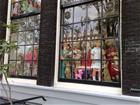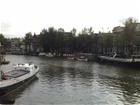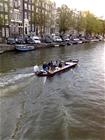This Is Too Much! The EU Must Withstand This Immediately!
Adelina Marini, February 16, 2012
 In 2010 I was happy with the outcome of the parliamentary elections in the Netherlands and most of all with the agreement, concluded for the sake of parliamentary support, with the xenophobic Freedom Party, led by Geert Wilders (PVV), which proved to be the biggest surprise at the elections then, winning 24 seats in the 150-seat Dutch parliament. I was happy because this agreement explicitly requires the Netherlands to fight Bulgaria and Romania to join Schengen only after the European Commission reports under the Cooperation and Verification Mechanism (CVM) in the area of justice and home affairs register sustainability in the fight against corruption (especially at the high political levels) and organised crime.
In 2010 I was happy with the outcome of the parliamentary elections in the Netherlands and most of all with the agreement, concluded for the sake of parliamentary support, with the xenophobic Freedom Party, led by Geert Wilders (PVV), which proved to be the biggest surprise at the elections then, winning 24 seats in the 150-seat Dutch parliament. I was happy because this agreement explicitly requires the Netherlands to fight Bulgaria and Romania to join Schengen only after the European Commission reports under the Cooperation and Verification Mechanism (CVM) in the area of justice and home affairs register sustainability in the fight against corruption (especially at the high political levels) and organised crime.
My happiness stemmed from the fact that Bulgaria's continued resilience to the Commission's recommendations could hardly be cured by the measures the European Commission offered, especially after the 3-year deadline expired for imposition of a safeguard clause and practically the EU found itself without any tools to correct the big mistake - that it endorsed Bulgaria as a fully fledged member without the county having fulfilled some of the fundamental conditions for that. Now, since there is a member state which has sealed with its taxpayers and voters its commitment to ensure that the EU would remain precisely as it used to be - an area of shared values and not only promises and nice eyes - I felt a bit relieved that my government (no matter which) would stop playing around the painfully known scenarios and may be it would finally embark on the reforms path.
The new initiative of the "Freedom" Party (I deliberately put freedom in brackets), ![]() however, is too much. It is a symptom of a bigger problem. It is neither only Dutch nor just Bulgarian. It is a common European one and in the context of the current troubles in Europe, it is turning into the stone that would turn the entire cart over. On its web page the party has launched a hotline collecting complaints from Dutch citizens from Central and Eastern Europeans. It actually calls on the Dutch to report problems this group of citizens create (Poles, Bulgarians and other Eastern Europeans), especially if it is about losing a job to a citizen of some of these countries.
however, is too much. It is a symptom of a bigger problem. It is neither only Dutch nor just Bulgarian. It is a common European one and in the context of the current troubles in Europe, it is turning into the stone that would turn the entire cart over. On its web page the party has launched a hotline collecting complaints from Dutch citizens from Central and Eastern Europeans. It actually calls on the Dutch to report problems this group of citizens create (Poles, Bulgarians and other Eastern Europeans), especially if it is about losing a job to a citizen of some of these countries.
![]() "This mass labour immigration causes many problems: nuisance, pollution, labour market competition, and integration and housing problems", the website points out, launched more than a week ago, according to Reuters. Even more unpleasant is that the Dutch government is refusing to ban the web page of its parliamentary ally, saying that this is a problem of the party. A spokesperson of the Polish embassy in the Hague is quoted by the agency as saying that there is a minority of Polish citizens who create problems in the Netherlands and that this had to be solved by the local authorities. "This kind of website which targets one specific group of nationals - central and east Europeans - is in itself discriminatory because you cannot have a website...targeting a specific group", spokesman Janusz Wolosz said.
"This mass labour immigration causes many problems: nuisance, pollution, labour market competition, and integration and housing problems", the website points out, launched more than a week ago, according to Reuters. Even more unpleasant is that the Dutch government is refusing to ban the web page of its parliamentary ally, saying that this is a problem of the party. A spokesperson of the Polish embassy in the Hague is quoted by the agency as saying that there is a minority of Polish citizens who create problems in the Netherlands and that this had to be solved by the local authorities. "This kind of website which targets one specific group of nationals - central and east Europeans - is in itself discriminatory because you cannot have a website...targeting a specific group", spokesman Janusz Wolosz said.
The web site in question evoked sharp reactions in many European institutions and even employers organisations in the Netherlands itself. On Saturday EU Internal Affairs Commissioner Cecilia Malmstrom tweeted the following: "European Commission concerned about new website by PVV in the Netherlands directed against EU citizens". More interesting, however, are the comments under this tweet, because some said that the website was directed against Poles and other citizens not against European citizens, which is part of the symptoms I was talking about.
Another commissioner, that of justice, fundamental rights and citizenship, Viviane Reding, who is also a vice president of the Commission, also expressed indignation and said: "In Europe, we stand for freedom. We stand for an open Continent where citizens can move, work and study wherever they like. The citizens of the 27 EU Member States should feel at home no matter where they decide to move. The PVV’s website runs totally counter to these principles. It is openly calling for people to be intolerant. Europe is facing difficult times. We will only solve our problems by increasing solidarity, not by denouncing fellow citizens".
According to Reuters, a Dutch employers organisation said that the website was irresponsible. "Companies need this labour force. Moreover, Poland is a member of the  European Union. What would be the reaction if Poland said: 'Dutch people are no longer welcome'?" By the way, this question is very well grounded. Without me not in the least minimising the need of mentality, economic and any other convergence in the EU, the Dutch, but also the Brits and any other EU citizens have to know that fellow citizens of theirs also create some problems here. Bulgaria, for example, has in the last years turned into a destination for alcohol tourism for the representatives of many of this type of countries, whose citizens cause disturbances of the public order as well. This, though, is not a reason to stigmatise all Brits or Dutch or Swedes and the country to close for them.
European Union. What would be the reaction if Poland said: 'Dutch people are no longer welcome'?" By the way, this question is very well grounded. Without me not in the least minimising the need of mentality, economic and any other convergence in the EU, the Dutch, but also the Brits and any other EU citizens have to know that fellow citizens of theirs also create some problems here. Bulgaria, for example, has in the last years turned into a destination for alcohol tourism for the representatives of many of this type of countries, whose citizens cause disturbances of the public order as well. This, though, is not a reason to stigmatise all Brits or Dutch or Swedes and the country to close for them.
If we decide to show to each other our dirty shirts the situation will only deteriorate further. Yes, the times are difficult; yes, for some more than for others, but to a large extent these are mistakes of EU's growing up. These are mistakes that were not predicted in time. At the moment the EU is suffering from a lack of an entirely complete and integrated single market. The high unemployment in many countries is due to a large extent to the labour restrictions some countries imposed against others, judging from data of the European Commission about the situation of the labour market in the EU. The Commission raised concerns many times about this problem even during its previous term, when it called the barriers to be removed and to allow free movement of workers within the EU. When there was economic prosperity this problem was not that sharply evident. But now, when all countries experience difficulties and unemployment is rising, it is very dangerous to apply the easy solutions - let's get rid of the aliens.
Our economies have reached such a level of interconnectedness that such measures could only further deteriorate the situation. By the way, Bulgaria is really not a good example but Poland is. This is the country that remained literally dry from the 2008 crisis and is among the few economies in Europe that grow. Poland, together with Slovenia, can boast as the country that has completed successfully the transition from  communism to Western European values. This is an achievement which would not have been possible if it was not for the European integration, without the possibility to feel equal with the rest. That Europe is on two and more speeds is a fact which seems to be easily swallowed, unlike the division of the European citizens to a first and second class.
communism to Western European values. This is an achievement which would not have been possible if it was not for the European integration, without the possibility to feel equal with the rest. That Europe is on two and more speeds is a fact which seems to be easily swallowed, unlike the division of the European citizens to a first and second class.
It suffices that we in Central and Eastern Europe have to endure the humiliation (quite justified sometimes) from our Western European partners (at every level) to look at us as if from above. But it is also true that for us achieving the common European values is a strife and a goal that should not be taken away from us because this would be calamitous not only for ourselves but for Europe itself too. If only a year ago the EU still was a positive role model for regional cooperation, an example of democratic values, media pluralism and independence, equality and economic prosperity, now more and more countries, even such that are famous with their dictatorships, smile spitefully at the obvious failure. This failure, however, is not only Central or Eastern European. It is a failure of all of us.
Moreover, the consequences of this failure again are for all of us. The EU is losing its foreign policy weight, it is losing its economic might and is sinking more and more into its own problems. Such actions, as those of the Dutch "Freedom" Party will only reaffirm the feeling that Europe needed a little more than 50 years to return where it started from. Do you remember where that was?